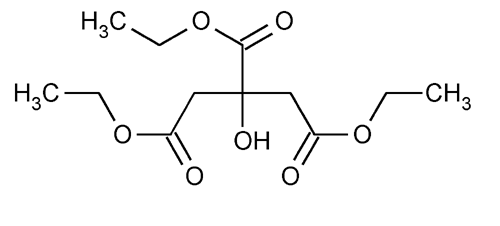Triethyl Citrate
» Triethyl Citrate contains not less than 99.0 percent and not more than 100.5 percent of C12H20O7, calculated on the anhydrous basis.
Packaging and storage—
Preserve in tight containers.
Identification—
B:
The retention time of the major peak in the chromatogram of the Assay preparation corresponds to that in the chromatogram of a similar preparation of USP Triethyl Citrate RS.
Specific gravity  841
841 :
between 1.135 and 1.139.
:
between 1.135 and 1.139.
Refractive index  831
831 :
between 1.439 and 1.441.
:
between 1.439 and 1.441.
Acidity—
Dissolve 32.0 g in 30 mL of alcohol, previously neutralized to phenolphthalein, add bromothymol blue TS, and titrate with 0.10 N sodium hydroxide. Not more than 1.0 mL is required.
Water, Method I  921
921 :
not more than 0.25%.
:
not more than 0.25%.
Heavy metals, Method II  231
231 :
0.001%.
:
0.001%.
Assay—
System suitability solution—
Prepare a solution in toluene containing about 30 mg each of USP Triethyl Citrate RS and USP Acetyltriethyl Citrate RS per mL.
Assay preparation—
Transfer about 300 mg of Triethyl Citrate, accurately weighed, to a 10-mL volumetric flask, dissolve in and dilute with toluene to volume, and mix.
Chromatographic system (see Chromatography  621
621 )—
The gas chromatograph is equipped with an on-column, temperature-programmable injector, a flame-ionization detector maintained at about 275
)—
The gas chromatograph is equipped with an on-column, temperature-programmable injector, a flame-ionization detector maintained at about 275 , and a 0.32-mm × 30-m column bonded with a 0.5-µm layer of phase G42. The column temperature is programmed as follows. Initially the temperature is maintained at about 80
, and a 0.32-mm × 30-m column bonded with a 0.5-µm layer of phase G42. The column temperature is programmed as follows. Initially the temperature is maintained at about 80 for 0.5 minute, then increased at a rate of 20
for 0.5 minute, then increased at a rate of 20 per minute to about 220
per minute to about 220 , and maintained at about 220
, and maintained at about 220 for 10 minutes. The injection port temperature is programmed as follows. Initially the temperature is maintained at about 85
for 10 minutes. The injection port temperature is programmed as follows. Initially the temperature is maintained at about 85 for 0.5 minute, then increased at a rate of 20
for 0.5 minute, then increased at a rate of 20 per minute to about 225
per minute to about 225 , and maintained at about 225
, and maintained at about 225 for 10 minutes. The carrier gas is helium, flowing at a rate of about 2.3 mL per minute. Chromatograph the System suitability solution, and record the peak responses as directed for Procedure: the relative retention times are about 0.9 for triethyl citrate and 1.0 for acetyltriethyl citrate; the resolution, R, between triethyl citrate and acetyltriethyl citrate is not less than 1.5; and the relative standard deviation for replicate injections is not more than 2.0% determined from both the triethyl citrate and acetyltriethyl citrate peaks, based on area percent calculation.
for 10 minutes. The carrier gas is helium, flowing at a rate of about 2.3 mL per minute. Chromatograph the System suitability solution, and record the peak responses as directed for Procedure: the relative retention times are about 0.9 for triethyl citrate and 1.0 for acetyltriethyl citrate; the resolution, R, between triethyl citrate and acetyltriethyl citrate is not less than 1.5; and the relative standard deviation for replicate injections is not more than 2.0% determined from both the triethyl citrate and acetyltriethyl citrate peaks, based on area percent calculation.
Procedure—
Inject 1 µL of the Assay preparation into the chromatograph, record the chromatogram, and measure all of the peak areas, excluding the solvent peak. Calculate the percentage of C12H20O7 in the portion of Triethyl Citrate taken by the formula:
100(A/B)
in which A is the triethyl citrate peak area response; and B is the sum of the area responses of all the peaks.
Auxiliary Information—
Please check for your question in the FAQs before contacting USP.
Chromatographic Column—
| Topic/Question | Contact | Expert Committee |
| Monograph | Robert H. Lafaver, B.A.
Scientist 1-301-816-8335 |
(EM105) Excipient Monographs 1 |
| Reference Standards | Lili Wang, Technical Services Scientist 1-301-816-8129 RSTech@usp.org |
USP32–NF27 Page 1371
Pharmacopeial Forum: Volume No. 32(1) Page 180
Chromatographic columns text is not derived from, and not part of, USP 32 or NF 27.
